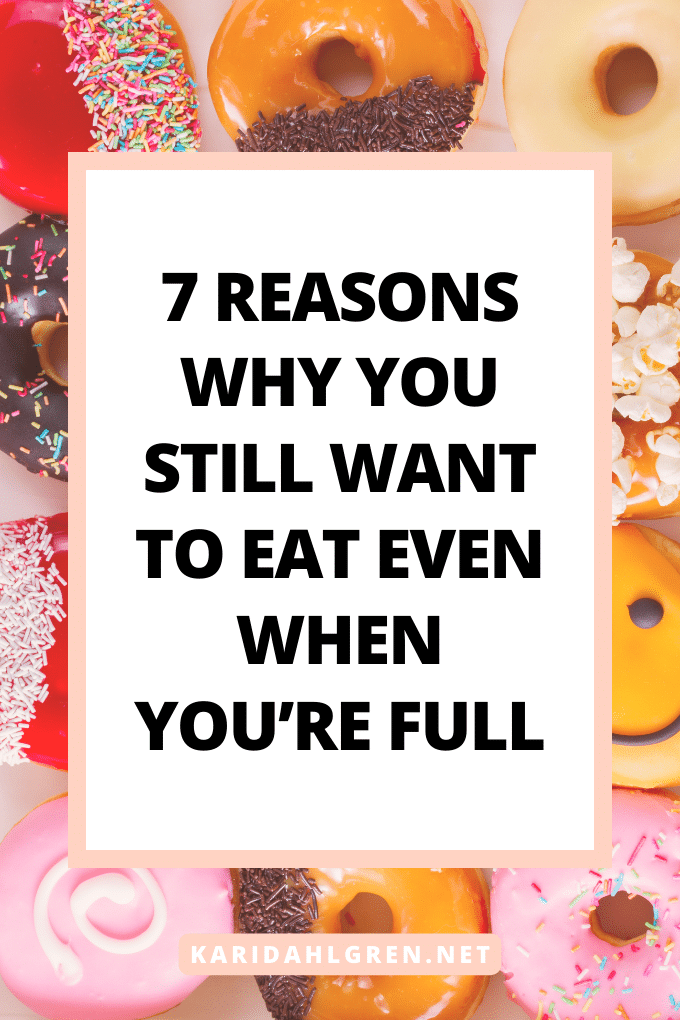
You just finished a delicious meal—yet also feel pulled towards sweets or maybe even a second helping. It can be a frustrating experience when you’re constantly thinking to yourself, “Why can’t I stop eating when I’m full?” It can trigger unnecessary self-criticism if you feel like you need to relearn how to stop eating when full.
The key is to explore both the biological and psychological triggers for overeating to develop a holistic, mind-body approach to healthy eating habits. Sometime hormones play a role in the desire to eat past fullness and other times it’s a psychological trait like people-pleasing that’s driving the behavior.
Learning how to stop eating when full starts with awareness as recognizing the obstacles is the first step towards action. To help you get there, this post will explore common triggers for the desire to eat when full—all backed by clinical evidence—followed by my best tips for honoring your fullness and making peace with food.
Why Can’t I Stop Eating When I’m Full? Evidence-Based Reasons
I know the self-critical mental chatter surrounding overeating all too well. If you’re constantly thinking to yourself, “Why can’t I stop eating when I’m full?” I hope you find relief, self-understanding, and self-compassion by learning about the evidence-based reasons for the desire to eat beyond fullness.
It can help to explore the biological factors first, followed by the psychological factors, as biology often overrides even the best intentions of maintaining a healthy mindset around food.
Here are some evidence-based reasons for feeling compelled to eat beyond fullness:
1. Imbalanced Leptin, The “Fullness Hormone,” Can Make It Difficult to Stop Eating When Full
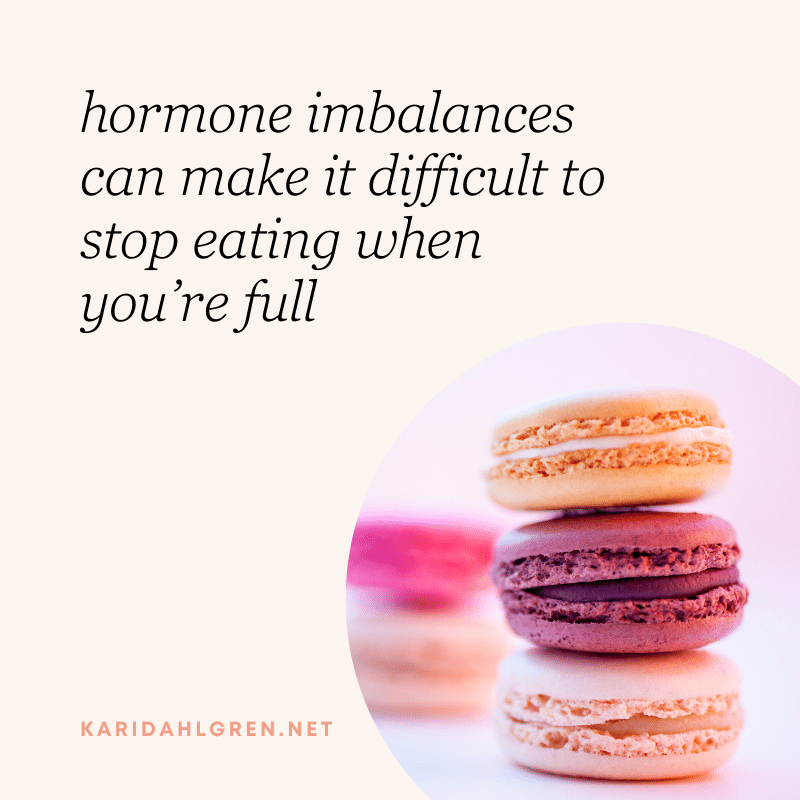
Leptin, known as the “satiety hormone” or “fullness hormone,” plays a crucial role in regulating energy balance by inhibiting hunger and increasing the sensation of fullness.[1] Produced by the body’s fat cells, leptin communicates directly with the brain’s hypothalamus, signaling when the body has enough energy stored in fat cells to reduce the desire to eat.[2]
This feedback loop is essential for learning how to stop eating when full and maintaining a healthy body weight. However, leptin resistance can disrupt this balance, creating a significant barrier to managing fullness and hunger.[1] With leptin resistance, the brain does not recognize leptin’s signals, leading to persistent feelings of hunger which can trigger the desire to eat even when full.
If you struggle with the persistent question—Why can’t I stop eating when I’m full?—talk to your doctor. They can assess for leptin resistance or other hormonal imbalances that affect appetite and eating behaviors.
2. Poor Environment Design Can Trigger Mindless Eating
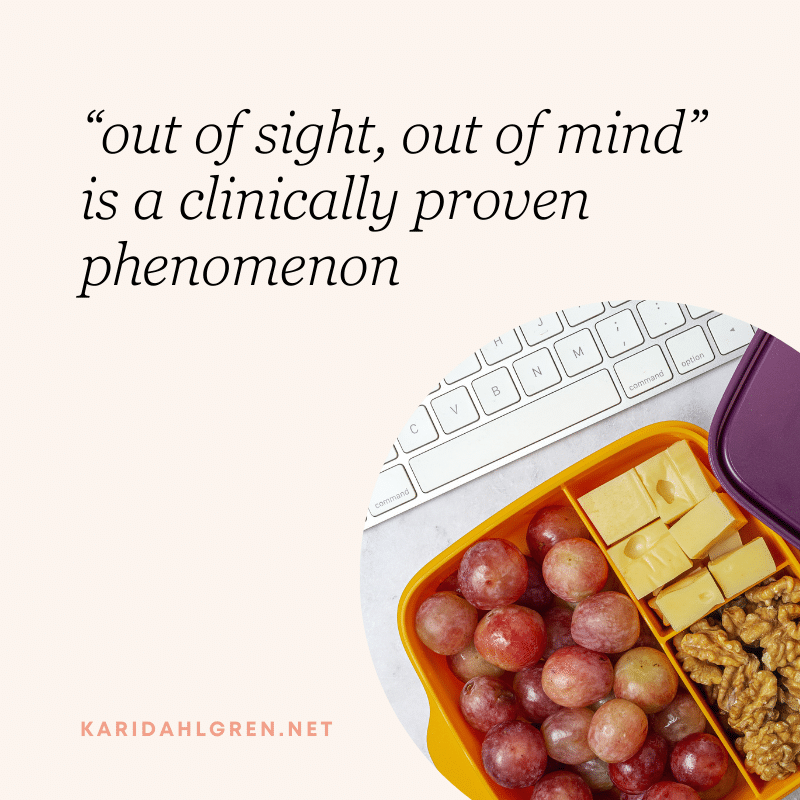
Visual cues significantly influence our eating habits, often leading us to rely on our eyes rather than our stomachs to determine food intake. In a well-known clinical study, Bottomless Bowls, participants consumed 73% more soup when eating from a self-refilling bowl—which refilled without their knowledge—and they didn’t even feel more satisfied by it.[3] This suggests that visual access to food can override fullness cues, making it hard to learn how to stop eating when full.
Additionally, if you tend to struggle with too much snacking at work, it could relate to visual triggers overriding fullness signals. For example, candy placed in a clear dish prompts more snacking than when candy is placed in an opaque dish, highlighting the power of visual cues in eating behavior.[4]
Beyond environment design, into eating psychology: I personally believe that eating psychology goes far beyond simple measures like environment design. If you already keep snacks out of sight but manage to hunt them down anyways, I think you’ll like my personal approach because it goes much deeper. Learn more in my free ebook, The Spiritual Seeker’s Guide to Stop Binge Eating.
3. Stress and Sleep Deprivation Can Make You Want to Eat When Full
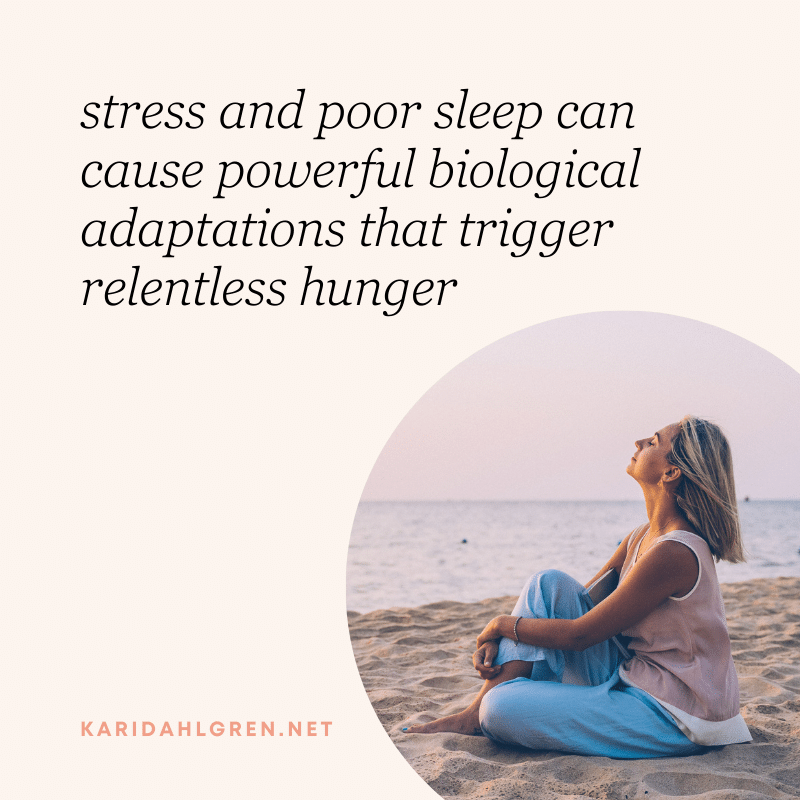
A lack of sleep can cause a decrease in leptin, the “fullness hormone,” and an increase in ghrelin, the “hunger hormone.”[5] This can make you feel hungrier and require even more food to feel satisfied. Quality sleep is key for healthy eating habits like learning how to stop eating when full.
Excessive stress can also play a role, as uncontrollable stress is linked with cravings for hyperpalatable foods (i.e. foods high in calories, fat, and/or carbs).[6] If you struggle with eating past fullness because you crave hyperpalatable foods, check your stress levels.
4. Restricting Carbs and Sugar Can Cause Cravings Even When Full
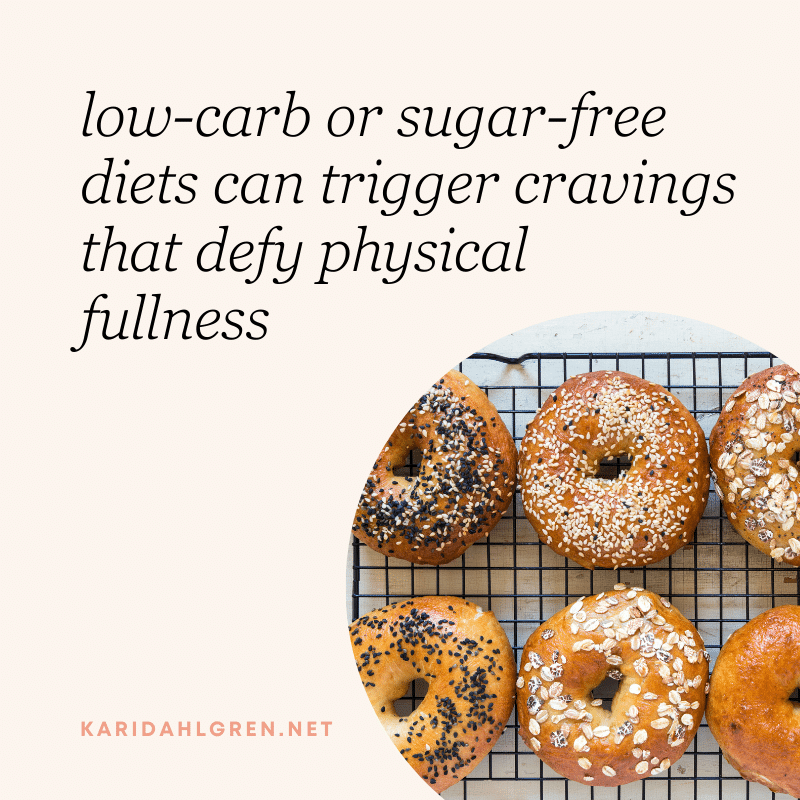
The rising popularity of low-carb diets, such as the ketogenic diet, has led many to cut back on carbohydrates and sugars. Yet, restricting carbs reduces glycogen stores (stored carbohydrate that fuels your muscles), which can trigger cravings for carbs.[7]
If you find yourself wondering—Why can’t I stop eating when I’m full?—take a look at any self-imposed dietary restrictions. If you’re restricting carbs and sugars and later find yourself craving them, it can make it difficult to learn how to stop eating when full.
Furthermore, the backlash of restriction goes beyond biology and affects your psychology, too. A growing pool of clinical evidence shows that people are more likely to crave foods that are off-limits.[8], [9], [10] For instance, when researchers asked a group of chocolate-lovers to restrict chocolate for just two weeks, they craved chocolate even more than before; highlighting the power of eating psychology.[11]
5. Excessive Dieting May Skew Your Perception of Fullness
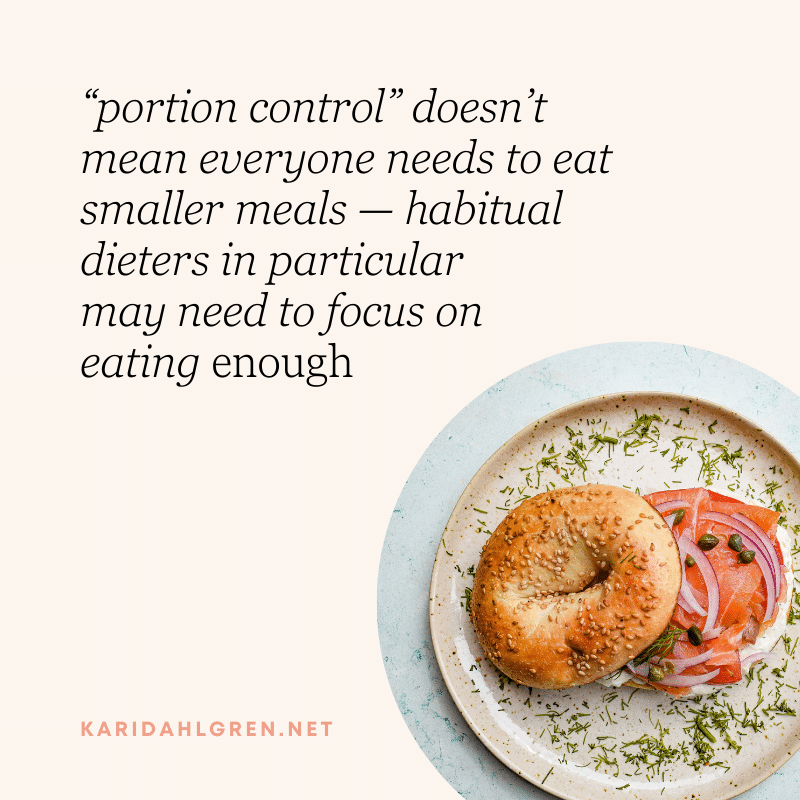
Speaking of restriction, popular opinion and current clinical research support the notion that smaller portion sizes can help prevent overeating.[12] However, some people may take this advice too far and not only limit portion sizes, but limit overall caloric intake too severely.
When the body is deprived of the calories it needs, hunger hormones begin to rise to encourage eating.[13], [14], [15] If calorie restriction goes on for too long, the body continues to adapt to encourage more eating, potentially leading to an inability to stop when full.
The next time you catch in a cycle of self-critical thoughts like, “Why am I eating so much? Why can’t I stop eating when I’m full?” take an objective look at your meal sizes. Are they providing enough fuel for your body?
6. Social Pressures Make It Hard to Learn How to Stop Eating When Full
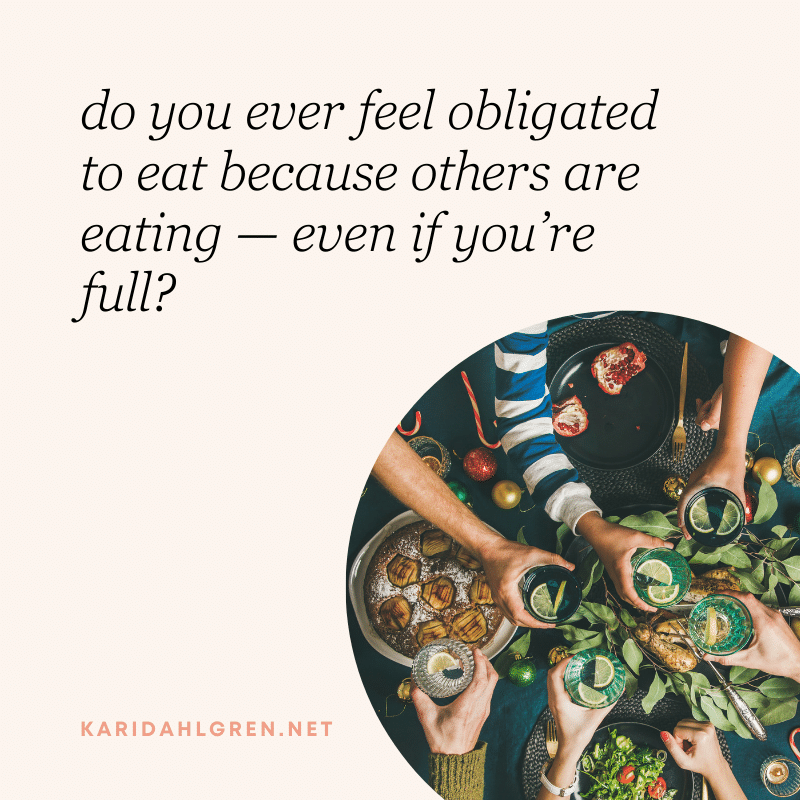
The desire to eat even when you’re full also goes far beyond the food on your plate. According to a study published in Physiology & Behavior, people tend to eat more when in the company of others compared to eating alone, a phenomenon known as the ‘social facilitation of eating.’[16]
Have you ever been there, eating more around other people compared to at home? Often, this can be linked to people pleasing and the desire to make others happy, even if it’s at your own expense. Overcoming people pleasing tendencies is a critical element of eating psychology and learning how to stop eating when full, especially if you find yourself eating in social situations often.
7. Emotional Eating Often Goes Beyond Physical Hunger
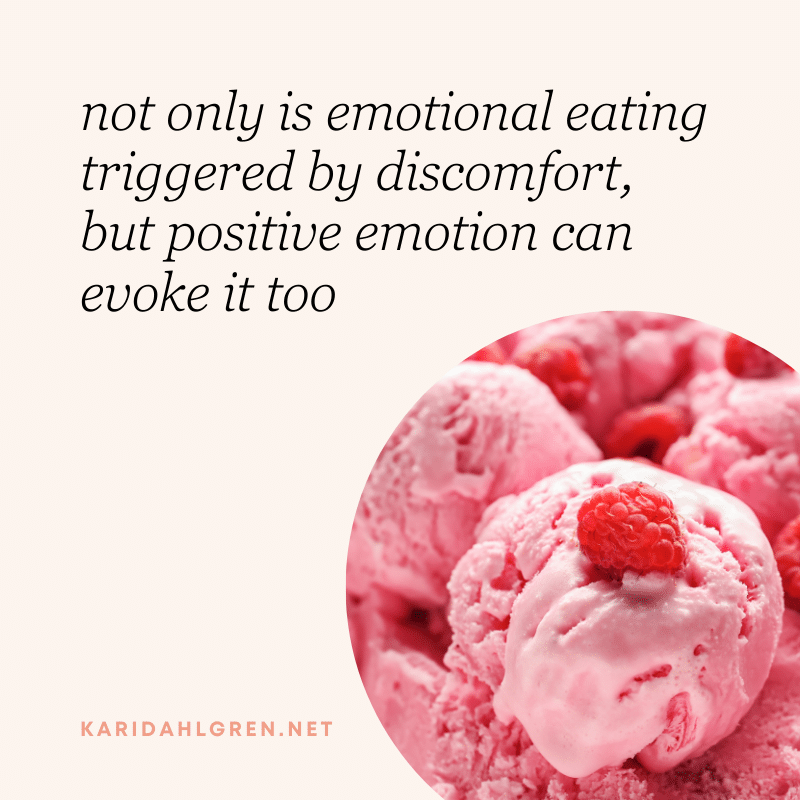
Emotional eating involves consuming food when you’re not hungry—often ‘comfort’ foods—in response to emotions rather than actual hunger. People that struggle with overeating are not only more likely to eat in response to negative emotions like stress, depression, and sadness,[17] but they’re also more likely to eat in response to positive emotion, too.[18]
Many of us are familiar with using food to suppress negative emotions like stress eating or boredom eating. But positive emotion can carry vulnerability of its own, as whatever brings you pleasure can be taken away, suggesting that even positive emotion-induced overeating is related to negative emotion as well.
How to Stop Eating When Full: A Mind-Body Approach
After learning the answers to the nagging question, “Why can’t I stop eating when I’m full?” the next step is to apply your newfound understanding in a practical way to change your eating habits. Without action, everything you just learned remains theoretical.
Here are some steps you can take to apply what you learned about how to stop eating when full:
- Get adequate sleep: Quality sleep helps regulate hunger hormones, making it easier to recognize fullness. Try improving your sleep with relaxation techniques or other evidence-based strategies like magnesium supplements.[19]
- Manage stress: Stress increases cravings for hyperpalatable foods.[6] Fortunately, relaxation techniques can help reduce overeating tendencies. For instance, just 8 days of progressive muscle relaxation technique was shown to help reduce night eating tendencies.[20]
- Eat adequate meals: Different people require different changes to learn how to stop eating when full. Some people may benefit from smaller portion sizes while others may need to pay attention to eating enough in order to prevent biological adaptations to excessive caloric restriction.
- Eat satisfying foods: Sometimes you can end up feeling full but not satisfied after eating, especially if you chose foods that you don’t actually like (which is common for dieters). Without the element of satisfaction, however, it’s difficult to learn how to stop eating when full.
- Avoid excessive dietary restrictions: Research has shown the reverse psychology of restriction where we want what we can’t have.[8], [9], [10], [11] By giving yourself permission to eat the foods you truly enjoy, you remove the heightened allure of such foods, improving your chances of stopping when you’re had enough.
- Address any emotional eating tendencies: No matter how satisfying your diet is, it will be difficult to learn how to stop eating when full if emotional eating goes unaddressed. To help with this, work on developing emotional awareness and emotional tolerance using tools like my Stop, Drop, & Feel, which asks you to sit still with the uncomfortable emotions that drive compulsive eating. When you train in tolerating discomfort, it helps reduce the desire to overeat.[21]
- Keep snacks out of sight: When snacks are within plain sight, you’re more inclined to eat them. By placing snacks out of view, you can use the energy normally spent resisting snacks and focus it on the psychological blocks to overeating instead.
- Talk to your doctor: Discussing your eating habits with a healthcare professional can help identify any underlying medical issues affecting your satiety cues. Addressing your overall health can make it easier to learn how to stop eating when full.
Action provides a sense of empowerment on the journey beyond compulsive eating. As you begin to take these steps, don’t forget to celebrate your success along the way. The question that inspired this article—Why can’t I stop eating when I’m full?—is a self-critical one. Do what you can to shift from self-criticism to self-awareness and self-compassion.
Take my quiz: As a bonus step for even more self-discovery, take my quiz to discover your eating psychology strength. Even if you struggle with eating past fullness, we all have a strength—and I want to help you build off it.
Honoring Your Fullness & Stopping Overeating
Overall, there are many understandable reasons for wanting to eat when you’re full. If you aren’t sleeping well, eating enough, or allowing yourself to eat foods that you actually enjoy, can anyone blame you for feeling compelled to eat beyond fullness?
The struggle with overeating is often filled with self-criticism, and I hope that this article filled you with self-understanding and self-compassion, along with a clear path towards a more peaceful relationship with food.




Sounds as if the advice could possibly work. Will repost the results. I’m desperate for help. Have a blessed day.
I would love to hear how it went Cyndy!
I think this is going to be very helpful because I am doing this from 5 years and I am only 14 and now its getting out of control. This is happening because a lot of people (my family, relatives and friends) told me that I need to stop eating that much and whenever they tell me not to eat, I eat more.
Oh, I so hope this will do it for me. I have been yo-yo dieting for 70 years. I figured I would die still looking for a way to stay slim and now to control recently diagnosed diabetes. I have spent so much money buying diet plans and as soon as I drop weight, but never reach a decent BMI, I get discouraged and gain the weight again.
Nicki! You are amazing! We all know how tough the dieting yo-yo frenzy can be, so I wish you the best of luck as you begin this journey 🙂 please keep in touch and let me know how it goes. xo
I get the point, but feeling my feelings isn’t that easy for me. I don’t know if you’re familiar with mental health issues, but I suffer from BPD. Just letting my feelings come up is nearly impossible for me because they’re 9 times stronger than feelings others feel (this is scientifically proven).
Hi Kara, I believe you when you say the emotions are 9x stronger, and I definitely don’t know enough nor am I qualified to talk about BPD, but I am glad you’re here and hope this was at least somewhat helpful.
Kara, your. Words. Have. Been. Such. A. Blessing. To. Me. Thank. You,
I love how straight forward and non-judgemental you are. That quote about food being wasted whether it went in your already full mouth or the trash (obviously paraphrasing) was like a light snapping on. It is spot on but something I had never thought of before. I’m so glad I found your page.
I’m so glad it helped! Thanks for the comment 🙂 xoxo
Thank you for posting this. I’ve been bulimic for over 20 years and no one has ever told be to respect my body. It’s such a powerful thought- take yourself out of your body and see it as a living thing! Obvious, I know, but so many people forget about themselves. Thanks again. X
Thank YOU for sharing Janie!
Thanks I fit into several of the categories. I will make an effort to become more mindful of what I am doing and feeling. Thanks
I’m glad this was helpful Lynn <3
Stop, drop and feel. I am so going to try this. I am 55, and I can remember bingeing since I’ve been a small child, it’s embedded in me. It’s my coping mechanism. Thank you for this page. Maybe something will finally click with me.
I’d love to know how it goes Judi! Keep me posted 🙂
So, I just like the taste and how it makes me feel so I want more.
Hi Miriam! I actually have a YouTube video about the desire to eat when food tastes really good: https://www.youtube.com/watch?v=r6d2bHI6J1I
I eat even when am full hopefully I will change it
You got this 🙂
What confuses me is that I have both a fear of eating and weight gain so am very underweight but binge. I know longer know if it’s caused by a biological lack or deprivation or bulimic withdrawal or emotional etc. It could be deprivation (mental and physical) but it could be bad habits? And what’s overeating for me could not be overeating but I have to recover and supposedly gain some weight yet I can only fit in so much food but don’t want to eat high calorie food. It all triggers binge urges. So I’m confused about what’s causing my binges at this point.
I thought it was emotional but what if it’s biochemical?
Hi Charis! I am so sorry to hear what you are going through. It sounds intense, and no one should have to feel triggered by food like this. Because you are underweight, I highly highly recommend working with a registered dietitian or seeking help from an eating disorder clinic. NEDA has really good resources! I hope these resources are helpful for you!! xoxo
I need this badly as my stomach doesn’t tell my brain I’m full so I keep eating. Only time I stop eating is when I start sweating while eating. I’m 160kg now I need a gastric sleeve I think. I’ve tried everything
Hi Darren! I am so sorry to hear about your struggle. Feeling rock bottom is never ever easy. If you find energy or space to try anything from this article, try to focus on the Stop, Drop, & Feel above anything else. It’s a great starting place. Please keep me posted – I’d love to help!!
Very comprehensive article. Thanks for this!
Thanks for the love Stana!
What I don’t get is for me, like most people, excessive restrictions lead to cravings, BUT when I allow myself junk food, the junk food itself causes more cravings! That is one hell of a catch 22! If I eat sugar or wheat stuff I just want more of it. Even after just eating it once. And I am very sensitive, my cravings are so strong I feel like I’m in hell until I can eat what I’m wanting… 😢Misery.
Hi Amy! I think so many of us can relate to you. Junk food indeed can cause more cravings for junk food, and the catch 22 is frustrating, to say the least! Have you seen my article about the stages of giving up dieting? It kind of sounds like you’re experiencing the common ‘rebellion binges’ that happen once we lift the food rules. It can be scary and evoke anxiety, and it’s important to listen to your body every step of the way. Some people can start by giving up the food rules and then tackle emotional tolerance, and some people need to start with the Stop, Drop, & Feel to build up that resilience before we can navigate the groundless feelings of giving up the food rules. You are the expert on you, so I hope this helps point you in the right direction so that you can take the best care of yourself 🙂